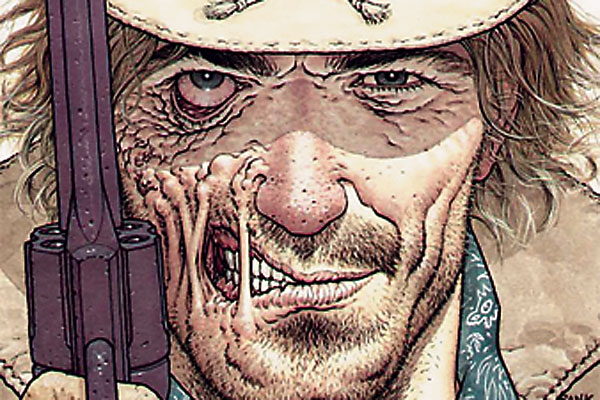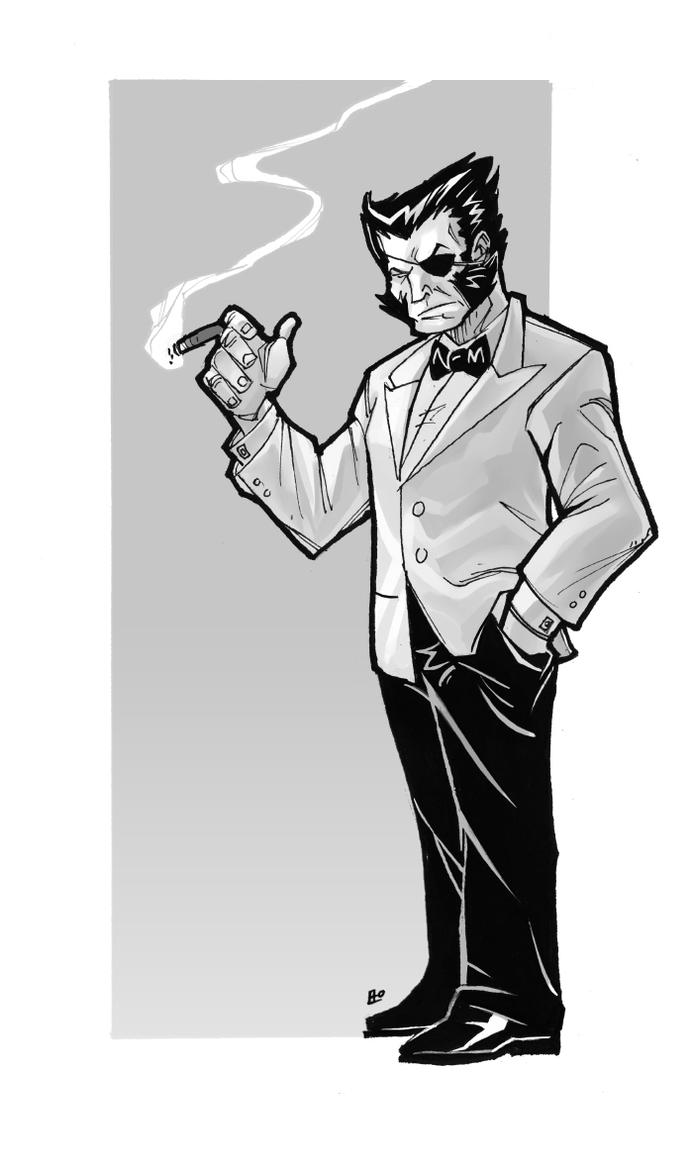| Character Identity |Steve Rogers,
AKA Nomad
| Age |40
| Character Differences |The primary difference between this version of Steve Rogers and most others is what he's experienced. His life has been characterized by a constant, unwinnable battle against fascism, and that has shaped his worldview considerably. Steve still holds true to all his beliefs about liberty, equality and justice- but he finds his faith in man waning. Can his country ever truly get better? Can they really overcome this dark period of their history, or are they forever damned to ignorance and hate? In his lowest moments Rogers oft thinks the answer no, and wonders if he might put the shield down and live out the rest of his days in peace with the woman he loves. The heavy guilt and sense of responsibility keeps him from pulling the trigger, but its always there, gnawing at the back of his mind.
In terms of power levels Nomad is a few steps above peak human. He's able to perform incredible feats of speed and strength, and seems remarkably able to shrug off punishment, but he's not going toe to toe with the big boys anytime soon. Much of his strength lies less in physical might and more in quick, tactical thinking and decades of leadership experience under his belt. He's led both a military unit and partisans to great success back on earth, and he'll bring it to bear out here as well.
| Brief World Background |Steve comes from a world trapped under the jackboot of the
Großgermanisches Reich. His timeline diverged at the Battle of Dunkirk, where the evacuation attempts were halted by HYDRA built super weapons, and the British Expeditionary Force was completely and utterly destroyed. This defeat laid the groundwork for Operation Sea Lion: the German army landed along the southern beaches of Great Britain and began their push toward London, only for FDR to unilaterally declare war on the Axis Powers- without the approval of congress and against the Neutrality Acts he had signed himself just a few years earlier.
The American intervention in the United Kingdom saw the first deployment of Captain America, the one and only successful subject of Project: Rebirth and the
singular superhuman in that timeline. His presence was celebrated by the men on the ground, as well as by the civilian population of the United Kingdom, yet he was oddly controversial back home. Many powerful people opposed the war, and they saw Captain America as an easy target for their propaganda: soon half the rags in the U.S were claiming the man behind the shield was a secret communist, or that his unnatural abilities were the creation of 'Jewish science.' Of particular controversy were the men he chose for the Howling Commandos, including a number of black and Japanese soldiers in a time where segregation was still army policy.
Instead of opening up the western front in the Mediterranean and North Africa as advised by the British, the less experienced American command staff opted to go with Operation Sledgehammer: an ill-advised invasion of the Cotentin Peninsula in Northern France, where the Germans would have numerical superiority. Major General Walker Price, a young and inexperienced leader, lost nearly half his entire division after pressing ahead into German lines and getting himself surrounded; the only reason his unit survived at all was due to the timely arrival of Captain America and a commandeered armored column, who held open the line long enough for a full rout back to the coast. Price was stripped of his command and shipped back to the States. Angry, humiliated, and heart beating with a desire for revenge, Price was the perfect candidate for what came next...
A coalition of businessmen, politicians and other officials formed a plot to unseat Franklin Roosevelt as president and end hostilities with the Axis powers. Their reasons were their own: ranging from those who wanted to reverse Roosevelt's economic policies to full-blown Nazi sympathizers. This plot had all the money and manpower it needed, but they wanted someone with the charisma, reputation and pull to ensure their plans would succeed, and Walker Price was that man. Since coming home he'd waged his own war in the press against Captain America and the U.S government, blaming them for the failure at Cotentin- and making allusions to unknown persons who were sabotaging the war effort to ensure the fighting went on longer for the sake of their own profits and power. He was all too happy to join in on this coup.
Walker arrived in Washington, D.C with a veritable army of demonstrators, many of them armed former veterans or soldiers who had abandoned their posts to join in the march; also among their number were anti-war protesters, fascists and Nazi sympathizers, and a slew of other folk who took issue with the current administration. Undercover HYDRA agents assured that the gathering was large, the presence of American fascists was undersold by the papers, and agitated against capitol police and the national guard wherever possible. What followed was several weeks of protesting and rioting, running street battles between all manner of factions and the government, and the eventual arrest of the president- ending with Major General Price instituting martial law across the nation.
An armistice was signed with the Axis powers, and America was drowned in civil unrest. The country was divided sharply on the events of that year. There was widespread violence along all sorts of lines: political, racial religious. Insurrections against the new government popped up across the nation but were quickly stomped out. These acts were used as justification for an extension of military rule, and the violence was blamed on communist agitators.
Its been twenty years since the war ended in an Axis victory: the Greater German Reich is a bloated slave empire suffering under the weight of constant civil strife and international pressure, Spain and Italy have formed a political bloc in opposition to the Reich and its puppet states, and the Co-Prosperity Sphere seeks to oust its former allies and their colonies from the eastern hemisphere.
The United States has developed its own strand of fascism, characterized by a faux democracy, intense racial segregation, and the merging of business, church and state into one, cumbersome behemoth. They collaborate openly with the Reich, and ‘National Socialist’ is as common a political identity as Democrat or Republican.
| Brief Character Background |Much of Steve Rogers' history remains unaltered: he was just a kid from Brooklyn who wanted to make a difference. After a dozen failed attempts at enlisting in the U.S Army he was picked as a candidate for Project: Rebirth, America's super soldier program. Doctor Erskine's serum was successful in transforming Rogers into Captain America, the first superhuman in mankind's history. Erskine's death at the hands of HYDRA assassins would ensure Steve was the
only superhuman as well. Handed a shield made of rare, vibration-absorbing metal and an appropriately patriotic costume, Rogers would begin his training: both as America's greatest soldier and its poster boy.
Then he was off to Europe to fight the Nazis with his own handpicked team, starting with the liberation of the United Kingdom where he met the love of his life. His role as Captain America proved far more complicated than he'd expected it to be, receiving just as much hate as he did admiration. A frightening number of Americans didn't see him as the symbol of justice and liberty that Rogers had been told he'd be- they saw him as a radical, a tool of warmongers, and even a race traitor. But Steve always believed in people. Always had hope that his country's flaws could be overcome. Most people were, in his mind, fundamentally decent.
When he finally came home from the front, however, Rogers was met with a starkly different nation from the one he'd left. He and his fellow veterans were spat on, assaulted. Called all sorts of nasty things. Segregation had intensified, there was widespread sectarian violence, and hatred and bigotry was everywhere he looked. It disheartened him, but he wasn't a man to give up when things got difficult. He resolved to do his part to fix his country: interviews, rallies, and peaceful demonstrations; get connected with other influential folks who believed in the dream.
Things only got worse.
It wasn't long before he was denounced as a dissident, stripped of his rank, and declared a 'person of interest' in unspecific criminal activity. HYDRA agents helped federal agents track Rogers, his friends, and even those he loved. Anyone who wasn't willing to give him up got prison time or worse. Again and again his faith was tested as he was forced to go underground, to continue his activities under a different name. It'd become obvious that this was a war he couldn't win with ballots and speeches, but bullets. He would lead a prominent resistance organization for the next fifteen years as
Nomad, the man without a country. Every single day would see his hope for change tested, would show him evidence that all he did was for naught; it was as if the universe conspired to tell him mankind was fundamentally anything but good.
A few days ago things did finally change, though not for the better, but certainly for the stranger. Little green men descended from the sky and took him unawares from his home in the Appalachian mountains, dragging Nomad up into their UFO and transporting him to a place far, far away. It was a bewildering experience, to be sure, and part of him wondered if he'd just finally snapped- or was he actually in
space?











